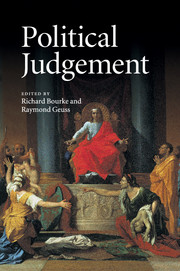Book contents
- Frontmatter
- Contents
- List of contributors
- Acknowledgements
- Introduction
- Part I The character of political judgement
- 1 What is political judgement?
- 2 Sticky judgement and the role of rhetoric
- 3 Theory and practice: the revolution in political judgement
- Part II Trust, judgement and consent
- Part III Rationality and judgement
- Part IV Democracy and modern political judgement
- Bibliography of the works of John Dunn
- Index
1 - What is political judgement?
from Part I - The character of political judgement
Published online by Cambridge University Press: 26 December 2009
- Frontmatter
- Contents
- List of contributors
- Acknowledgements
- Introduction
- Part I The character of political judgement
- 1 What is political judgement?
- 2 Sticky judgement and the role of rhetoric
- 3 Theory and practice: the revolution in political judgement
- Part II Trust, judgement and consent
- Part III Rationality and judgement
- Part IV Democracy and modern political judgement
- Bibliography of the works of John Dunn
- Index
Summary
In his recently published memoirs the former British Ambassador to the United States, Sir Christopher Meyer, describes a dinner party which he attended in Washington in early February 2001. George W. Bush had just been elected – or at any rate inaugurated as – President of the United States, and the members of his new administration were awaiting the first visit of the British Prime Minister Tony Blair. Present at the dinner were several close advisers of the new US President, figures strongly associated with the Republican Right, so-called ‘neo-conservatives’ such as Richard Perle and David Frum. The conversation quickly moved to Britain's recent decision at the meeting of the Council of Europe in Nice to support closer European defence cooperation. These ‘neo-conservatives’ thought that Blair had fallen victim to a French plot to harm the USA by introducing a new, independent military force in Europe, which could in principle compete with NATO. Sir Christopher, however, tried to convince them that the projected new form of defence cooperation represented no more than an increase in Europe's ability to discharge subaltern functions within a NATO that would continue to be dominated by Washington. The new arrangements, correctly understood, were therefore not only no threat to the USA; they were in Washington's own best long-term interest. Sir Christopher then continues:
I found it an uphill struggle to place our initiative in the context which Blair had intended.
- Type
- Chapter
- Information
- Political JudgementEssays for John Dunn, pp. 29 - 46Publisher: Cambridge University PressPrint publication year: 2009
- 10
- Cited by



